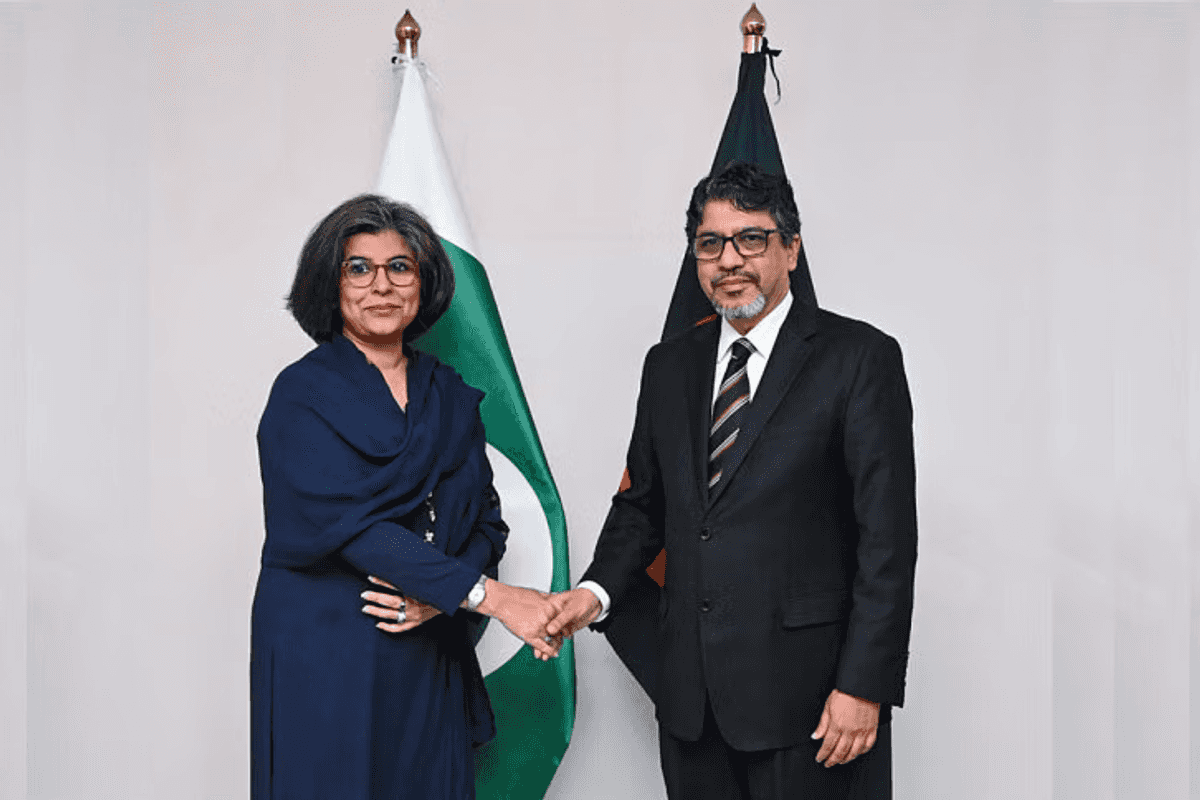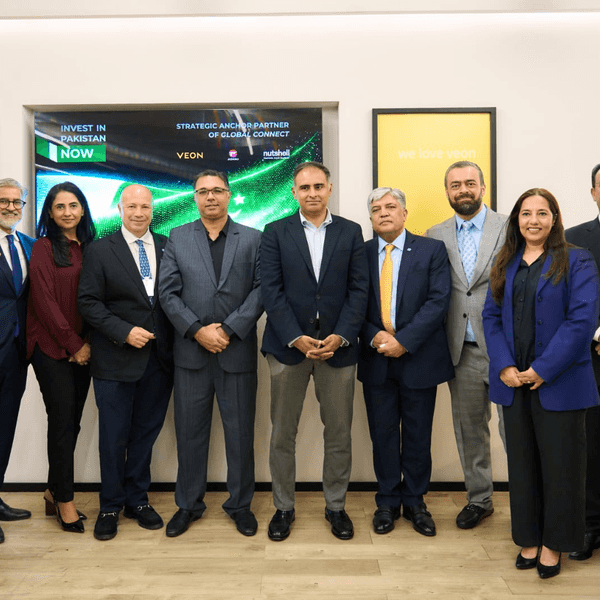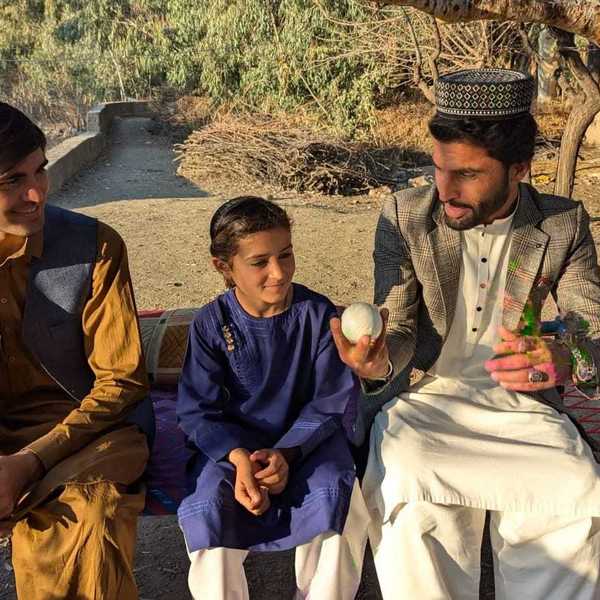Pakistan, Bangladesh hold diplomatic talks after 15-year pause
Pakistan’s Deputy Prime Minister and Foreign Minister Ishaq Dar will visit Dhaka on April 21, Foreign Office confirms

Asma Kundi
Producer, Islamabad
Asma Kundi is a multimedia broadcast journalist with an experience of almost 15 years. Served national and international media industry as reporter, producer and news editor.

Pakistan’s Foreign Secretary Amna Baloch meets her Bangladeshi counterpart, Md Jasim Uddin, during bilateral talks in Dhaka.
Courtesy: The Daily Star
The renewed engagement marks a shift from years of strained ties and diplomatic silence.
Discussions focused on trade, connectivity, and defense cooperation.
Experts see cautious optimism, stressing the need for sustained dialogue and trust-building.
In a major diplomatic breakthrough, Pakistan and Bangladesh resumed foreign secretary-level talks on Thursday for the first time in 15 years, marking a cautious yet promising step toward reviving long-stalled bilateral relations.
The high-level talks were held at the State Guesthouse Jamuna in Dhaka, with Bangladesh’s Foreign Secretary Md Jasim Uddin leading the host delegation and his Pakistani counterpart, Amna Baloch, heading the visiting team.
According to Shafiqul Alam, Press Secretary to Bangladesh’s Chief Adviser, the visit will feature comprehensive discussions covering all issues of mutual concern.
As part of her visit, Baloch is also scheduled to pay courtesy calls on Bangladesh's Foreign Affairs Adviser Md Touhid Hossain at the secretariat, as well as Chief Adviser Professor Muhammad Yunus.
The meeting — the first of its kind since 2009 — reflects a renewed commitment on both sides to repair relations long burdened by political mistrust and historical grievances.
Dar to visit Dhaka
Adding to the diplomatic momentum, Pakistan’s Deputy Prime Minister and Foreign Minister Ishaq Dar is set to visit Dhaka on April 21 — marking the first high-level visit by a Pakistani diplomat in over a decade.
The trip has been confirmed by Pakistan’s Foreign Office.
Revival of trade ties
Bangladesh’s High Commissioner to Pakistan, Iqbal Hussain Khan -- currently in Dhaka for the foreign secretary-level talks -- has signaled fresh momentum in trade relations between the two countries.
“Pakistan sees strong potential to boost its exports to Bangladesh, particularly if its products remain price-competitive,” Khan told The Daily Star.
He noted that Pakistan, serving as a transit hub for goods from Afghanistan and Iran, could also facilitate Bangladesh’s imports from those countries.
Moreover, discussions are underway to launch direct flights between Pakistan and Bangladesh, which could further strengthen commercial and people-to-people links, Khan added.
What experts have to say on bilateral talks
‘A thaw in relations’
Former Pakistani diplomat Masood Khan told Nukta, “We are witnessing a massive thaw in our relations with Bangladesh, and there is immense potential for growth in economic and commercial ties. That’s why political dialogue and mutual understanding are essential.”
He said that both countries share a common history and “let’s not forget that the foundations of the future state of Pakistan were laid in Bengal, and we were one nation until 1971.”
He noted, “To rebuild trust, we must go beyond trade and investment. Investing in cultural linkages and promoting people-to-people exchanges is crucial to dispel misgivings and win hearts and minds. Immersive diplomacy is the way forward.”
Cautious optimism
Political and international affairs expert Hassan Askari told Nukta that the visit of the Pakistani delegation to Bangladesh and the initiation of meetings is a welcome development and could mark the beginning of a new chapter in bilateral relations.
He noted that during ousted PM Sheikh Hasina's tenure, ties between the two countries had been minimal to almost nonexistent. While these meetings are still at a very early stage and it's too soon to draw definitive conclusions, there is hope that this could lead to positive developments.
Askari emphasized that the improvement of bilateral relations depends on concrete actions rather than mere statements. “We will have to see whether these meetings result in any trade cooperation initiatives and, more importantly, how effectively they are implemented,” he said.
He also pointed out that there are still many negative perceptions about Pakistan in Bangladesh, which can only be addressed gradually through practical and consistent efforts. Nonetheless, he termed the move “a good beginning.”
‘Revisiting historical grievances and seizing new opportunities’
Executive Director Sanober Institute Qamar Cheema told Nukta that the foreign secretary-level meeting is important, particularly as it comes after a 15-year gap.
“There is a clear appetite from the new political establishment in Bangladesh to re-engage, but at the same time, I believe the conversations will inevitably revisit historical grievances,” he said. “Bangladesh may raise issues such as war damages and the return of its assets from 1970, so this is just the beginning of a broader, more comprehensive dialogue.”
Cheema also pointed out that Pakistan is approaching the talks with caution. “The current Bangladeshi government is a caretaker setup and lacks an electoral mandate, so Pakistan is treading carefully,” he noted. “Nonetheless, such meetings are crucial for trust-building. We’re already seeing signs of movement—visas are being processed swiftly, businesses are re-engaging, and new trade initiatives are emerging.”
He added that, with India cancelling several trade agreements with Bangladesh, Pakistan sees an opportunity to deepen its economic footprint. “Pakistani airlines like Fly Jinnah and AirSial are exploring direct Karachi-Dhaka routes, which could pave the way for greater connectivity.”
“There’s potential for a comprehensive partnership,” Cheema emphasized. “But both countries will need to navigate historical baggage, address current realities, and plan for the future. The narrative of ‘two nations, one people’ resonates strongly, and there’s clearly a public appetite on both sides for better relations.”
Pakistan’s push for normalization
Pakistan has taken the lead in restarting bilateral engagement after a 15-year diplomatic freeze. Bangladesh, too, has shown openness to renewing ties -- particularly in areas like trade, defense cooperation, and broader regional collaboration.
Both sides acknowledged recent high-level interactions, including meetings between Bangladesh’s Chief Adviser and Pakistani Prime Minister Shehbaz Sharif on the sidelines of the D-8 Summit in Cairo in December 2024 and the UN General Assembly in New York in September last year.
A separate meeting was also held between Bangladesh’s foreign affairs adviser and Pakistan’s deputy prime minister during the Commonwealth Heads of Government Meeting in Apia, Samoa in October 2024.
Observers say the resumption of formal dialogue marks a potential turning point -- one that could lead to a more pragmatic, forward-looking relationship grounded in mutual respect.
Highs and lows of Pakistan-Bangladesh ties
The last foreign secretary-level talks between Pakistan and Bangladesh were held in 2010, during Prime Minister Sheikh Hasina’s first term. Since then, relations between the two nations have steadily deteriorated, largely due to unresolved tensions stemming from the 1971 war.
Ties hit a low point in 2013 when Pakistan condemned the execution of Jamaat-e-Islami leader Abdul Quader Molla, triggering a strong diplomatic protest from Dhaka. Similar incidents followed in 2014, further straining relations.
A brief attempt at rapprochement came in 2020 with a phone conversation between then prime ministers Imran Khan and Sheikh Hasina. However, little progress was made, as longstanding issues—including Bangladesh’s call for a formal apology, repatriation of pre-1971 assets, and the return of stranded Pakistanis -- remained unresolved.
A notable shift came in August 2024, when Pakistani Prime Minister Shehbaz Sharif congratulated Professor Muhammad Yunus on becoming head of Bangladesh’s caretaker government following the end of Sheikh Hasina’s tenure.
A month later, the two leaders met on the sidelines of the UN General Assembly in New York—an encounter that hinted at a possible thaw in relations.
Since Professor Yunus assumed office, diplomatic engagement between Dhaka and Islamabad has noticeably picked up. Both sides have expressed renewed interest in rebuilding ties through trade, dialogue, and cooperation.
In January 2025, military leaders from both countries met in Rawalpindi, agreeing to deepen defense cooperation and work jointly toward regional peace and stability.
During the visit, Bangladesh’s Principal Staff Officer Lt Gen S.M. Kamrul Hassan held meetings with Pakistan’s Chief of Army Staff Gen Asim Munir and Chairman of the Joint Chiefs of Staff Committee Gen Sahir Shamshad Mirza.
According to the Inter-Services Public Relations (ISPR), the Pakistani military's media wing, the discussions focused on evolving security dynamics and expanding avenues of military collaboration.







Comments
See what people are discussing